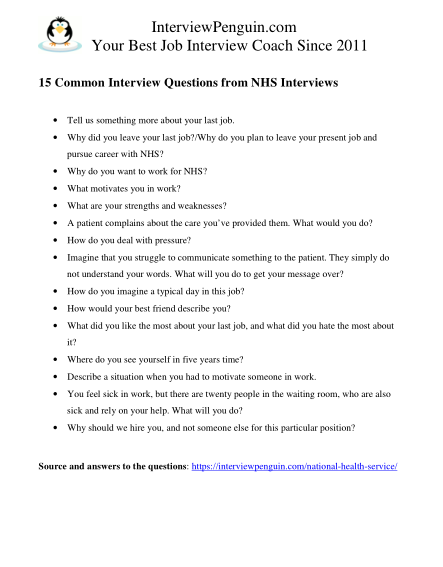In a typical interview with NHS, you will talk to a small panel of interviewers. This applies to all nine pay bands, both England and Scotland. The people from the panel will ask you three types of questions:
- First group of questions will relate to your past working experience–where you worked, what you did there, how you felt about the job, your bosses and colleagues, what you learned in work, and why you left the job. If this is your very first job application, they will skip these questions altogether. If you’ve been with NHS for some years already, the questions will relate mostly to to your employment with them, up to this point, in a lower pay band.
- Second group consists of so called screening, or personal questions. Your answers to these questions tells them more about your personality, who you are, what you want to achieve in your life, what motivates you in work, and basically whether you are a right kind of person for the job. You will get at least some of these questions in all interviews with NHS–regardless of the job, and whether you have any previous experience.
- The last group consists in situational questions. They will outline various situations that may happen in your job (conflict with a patient, emergency replacement, misunderstanding of your language, loss of motivation, etc), trying to understand your attitude to work, to patients, and basically how you’d react in any of the situations. You will get some situational questions in nearly every interview with NHS, but the number and complexity depends on the job you apply for.
In this article I will give you some advice on how to answer questions from each group. Enjoy!
Table of Contents
Tell us something more about your last job.
Try to speak about things that relate to the job you want to get with NHS. Working duties that helped you to get ready for the new position, things you achieved in work (for the patients and for your employer), certifications you earned (if any), and so on.
They may ask you some follow up questions about particular duties you had, challenges you faced, or about anything else. Try to talk with enthusiasm about your work. Your body language is extremely important. They should get an impression that you enjoy working in healthcare. If you apply for band 2, 3, 4, and 5 jobs, and have worked with NHS before, make sure to praise the organization for the good things, and tell them what you’ve learned in the previous role, and how it prepared you for the new one.
Why did you leave your last job?/Why do you plan to leave your present job and pursue career with NHS?
You should be honest, but at the same time avoid negative remarks about your colleagues and bosses. Nobody wants to hire a new nurse/doctor/medical receptionist who will complain about something at all times.
The best reasons to refer to are practical reasons–you didn’t like the location of the job, there weren’t any career growth opportunities, you didn’t like the direction the healthcare institution was taking, you didn’t feel the job security, something you will get with NHS, etc.
Why do you want to work for NHS?
An obvious answer is saying that you want to help people, that you get satisfaction from it, or even consider it your personal mission. But this is not really a great answer, since you can help people working for any other healthcare institution, or even working privately…
I suggest you to focus on two things in your answer instead:
- The particular job you want to have with National Health Service. Say how the job descriptions matches your expectations, how you imagine yourself doing a great job in that particular role.
- The reputation and the magnitude of the organization. Nowhere else in the United Kingdom would you find such a job security and level of organization as with NHS. The benefits they offer to all employees are excellent, and the same can be said about the training programs and career growth opportunities.
- We have 7 sample answers to this question online, check it here: Why do you want to wok for the NHS?
What motivates you in work?
This is one of the easier interview questions, and you actually have many options for a good answer. One of them is saying that you love to help people, see a meaningful purpose in what you do, and basically devoting your time to something meaningful (in your eyes) motivates you to try your best in work every day.
Another option consists in referring to your goals (both personal and professional). Your job helps you to get closer to your goals, and keeping them on your mind helps you to move on even when you struggle with motivation.
Special Tip: Want to practice your interview answers later? Download a full list of questions for NHS interviews in a one-page long PDF document:

What are your strengths and weaknesses?
You should pick some strengths which are relevant for the job you try to get. With most healthcare profession it will be empathy, emotional intelligence, communication skills, sense for responsibility, ability to handle pressure, etc. When it comes to band 6, 7, 8 jobs, however, you should focus more on skills and strengths related to your specialty (psychology, bio-medicine, speech and language therapy, etc)
Likewise, you should choose a weakness that isn’t central for the job. For example you do not need management skills as a doctor, or strong computer skills, and you do not have to be superbly creative. These things are important in many other jobs, but they aren’t crucial for a good healthcare professional.
If you talk about a weakness that is relevant for the job, do not forget to mention that you work on it, that you try to improve on your weakness, in order to become even better in what you do.
A patient complains about the care you’ve provided them. What would you do?
Ensure the interviewers that you take each feedback seriously, and will patiently listen to every complaint, and try to improve your services for the next time. You can also say that you will always stay polite, never getting into argument with the patient–even if they were wrong and unjust.
You can even show some empathy, saying that you understand the emotional and physical strain people experience in an office of a doctor/in a hospital, and therefor you would not take their bad words personally…
How do you deal with pressure?
You may work in a busy medical practice. Some days there won’t be any time to ease a bit, to relax, to smoke a cigarette or have a cup of tea. One patient will go in after another, and you will simply have to deal with that.
Tell the interviewers that you know what will be expected from you in job, and do not count with an easy ride.
You can say that in difficult moments you always remind yourself the meaningful purpose of your job, why you do what you do. You can even say that you work better under pressure, or that you are naturally stress resistant, and manage to stay relatively calm even in the most trying circumstances… You can check 7 sample answers to this question here.
Imagine that you struggle to communicate something to the patient. They simply do not understand your words. What will you do to get your message over?
They test mostly your attitude with the question. Show them that you are ready to go above and beyond for the patient. Understanding is crucial in healthcare, since any misunderstanding of your instructions can have serious effects on patient’s health.
You can say that you will use the most simple language, or even pictures and demonstration, to help the patient understand. You can also stress how crucial it is to get your message over, and that you will always try all possible means of doing that…
Some other questions you may get in your NHS interview
- How do you imagine a typical day in this job?
- How would your best friend describe you?
- What did you like the most about your last job, and what did you hate the most about it?
- Where do you see yourself in five years time?
- Describe a situation when you had to motivate someone in work.
- You feel sick in work, but there are twenty people in the waiting room, who are also sick and rely on your help. What will you do?
- Why should we hire you, and not someone else for this particular position?
Summary and next steps
Interviews with NHS belongs to easier interviews. In most cases, you won’t face any tough technical questions related to your field of healthcare.
The interviewers will use mostly personal and behavioral questions, and you can prepare for these questions in advance. Read this article once again and try to answer each question. If you need help with the answers, hire an interview coach, or have a look at our Interview Success Package.
Thank you, and good luck!


